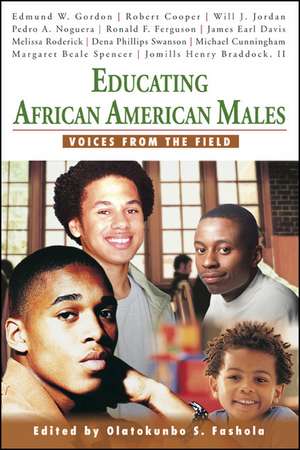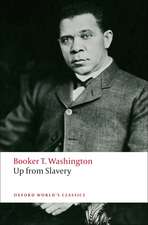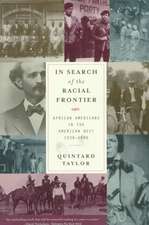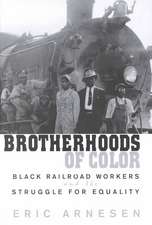Educating African American Males: Voices From the Field
Autor Olatokunbo S. Fasholaen Limba Engleză Paperback – 25 mai 2005
- sociological;
- socio-economic;
- emotional;
- cultural;
- cognitive;
- teacher-student interaction;
- access to educational opportunity outside of the classroom.
Offering unique contributions to both the literature and practice, Fashola et al pave a way toward achieving high-quality education for African American males.
| Toate formatele și edițiile | Preț | Express |
|---|---|---|
| Paperback (1) | 308.94 lei 43-57 zile | |
| SAGE Publications – 25 mai 2005 | 308.94 lei 43-57 zile | |
| Hardback (1) | 559.91 lei 43-57 zile | |
| SAGE Publications – 25 mai 2005 | 559.91 lei 43-57 zile |
Preț: 308.94 lei
Nou
59.11€ • 61.89$ • 48.91£
Carte tipărită la comandă
Livrare economică 07-21 aprilie
Specificații
ISBN-10: 1412914345
Pagini: 320
Dimensiuni: 152 x 229 x 17 mm
Greutate: 0.44 kg
Ediția:New.
Editura: SAGE Publications
Colecția Corwin
Locul publicării:Thousand Oaks, United States
Recenzii
"Fashola's collection of these powerful research studies is both persuasive and well-documented. The studies and evidence provided by Noguero, Ferguson, Roderick, and others help promote the dialogue about why African American males are not succeeding academically and what schools can do about it."
"The highly practical and rigorously informative research presented advocates holding high standards for African American males by using holistic approaches that recognize achievement via alternative means to the traditional, quantitatively derived measurements. Its multidisciplinary approach helps further the conversation for providing effective pipelines to close the achievement gap."
Cuprins
Introduction
Foreword by Edmund W. Gordon
Preface
Acknowledgments
About the Editor
About the Contributors
1. Cultural Issues in Comprehensive School Reform, Robert Cooper, Will J. Jordan
2. Developing the Talents of African American Male Students During the Nonschool Hours, Olatokunbo S. Fashola
3. The Trouble With Black Boys: The Role and Influence of Environmental and Cultural Factors on the Academic Performance of African American Males, Pedro A. Noguera
4. Teachers' Perceptions and Expectations and the Black-White Test Score Gap, Ronald F. Ferguson
5. Early Schooling and Academic Achievement of African American Males, James Earl Davis
6. What's Happening to the Boys? Early High School Experiences and School Outcomes Among African American Male Adolescents in Chicago, Melissa Roderick
7. Black Males' Structural Conditions, Achievement Patterns, Normative Needs, and "Opportunities," Dena Phillips Swanson, Michael Cunningham, Margaret Beale Spencer
8. Athletics, Academics, and African American Males, Jomills Henry Braddock II
9. Conclusion
Index
Notă biografică
Olatokunbo (Toks) S. Fasholais a senior research fellow with Optimal Solutions Group and an adjunct research scientist and faculty associate at Johns Hopkins University. She has served as principal investigator, evaluator, and advisor for several programs and program evaluations across the country.
Prior to joining the Optimal Solutions Group, Fashola was the research director of the Comprehensive School Reform Center at the American Institutes for Research (AIR), where she was primarily responsible for the evaluation and production of AIR Reports. This work involved reviewing and evaluating the effectiveness of K-12 programs. Fashola was also involved in the National Longitudinal Study of the No Child Left Behind Act (NLS-NCLB) and served as a senior content advisor for the What Works Clearinghouse in the area of high school dropouts.
Her more recent work addresses the education of African American males, afterschool programs, schoolwide reform, and program evaluation and rigorous research in general and special education.
Toks Fashola is the editor of Educating African American Males: Voices From the Field (Corwin Press, 2005) and wrote some of the book¿s chapters. She wrote Building Effective Afterschool Programs (Corwin Press, 2001) and Show Me the Evidence!: Proven and Promising Programs for Americäs Schools. Fashola has also served as an author of book chapters in Effective Programs for Latino Students.
Fashola has served on panels to reputable organizations such as the U.S. Department of Education¿s IES and the National Academy of Science¿s Committee on Research in Education as well as the National Science Foundation. Her work has been featured on National Public Radio (NPR) and on Public Broadcasting Services (PBS).
She has served as an expert witness in the area of desegregation and currently serves on the National Education Steering Committee of the Campbell Collaboration, an international methods organization dedicated to conducting systematic reviews of academic and social science research. Fashola also serves as a national advisor to the Boys and Girls Club of America.
Toks Fasholäs areas of interest include reading, early childhood education, data-driven decision-making, afterschool programs, high school dropouts, emergent and adolescent literacy, and research methods.
Descriere
- sociological;
- socio-economic;
- emotional;
- cultural;
- cognitive;
- teacher-student interaction;
- access to educational opportunity outside of the classroom.
Offering unique contributions to both the literature and practice, Fashola et al pave a way toward achieving high-quality education for African American males.















